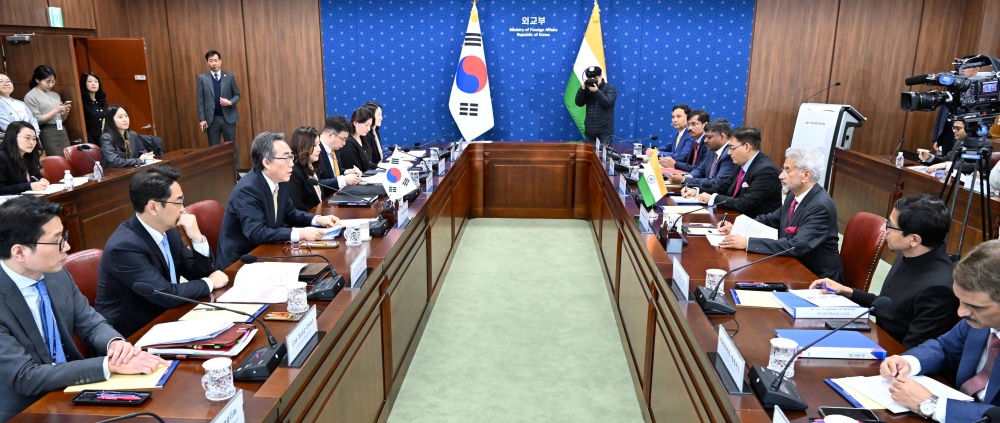-
About the Ministry
About the Ministry
- Press
- Countries & Regions
- Policy Information
- Life In Korea
Ministry News
- Notices
- Ministry News
- Press Releases
- Press Briefings
- Speeches & Published Materials
- Newsletter Service
- Diplomatic White Paper
Outcome of 10th ROK-India Joint Commission Meeting (JCM)
- Date
- 2024-03-08
- hit
- 22277

- Strengthening of the strategic communication and cooperation with India, a key partner of the Global South with shared values
- Enhancement of the collaboration in the defense industry, supply chains, critical technologies, and infrastructure
- Consolidation of the value-based collaboration at the regional and global levels
On the morning of March 6th, at the Ministry of Foreign Affairs in Seoul, Minister of Foreign Affairs Cho Tae-yul co-chaired the 10th ROK-India Joint Commission Meeting (JCM) with Dr. Subrahmanyam Jaishankar, the Minister of External Affairs of India.
During the first face-to-face meeting between the foreign ministers after their inauguration, both ministers appreciated the active high-level exchanges between the two countries, including two summit meetings in 2023, on the occasion of the 50th anniversary of diplomatic ties. They affirmed their commitment to further strengthen strategic communication and cooperation as key partners in the Indo-Pacific and Special Strategic Partners with shared values.
The ministers pledged continued cooperation to ensure the smooth progress of the procurement of the second batch of the K-9 self-propelled howitzers (known as 'Vajra' in India), a symbol of defense industry cooperation between the two nations. They also expressed their determination to advance collaboration in defense and the defense industry. Furthermore, the two ministers agreed to explore ways to hold the 2+2 Meeting of Foreign and Defense Vice Ministers as soon as possible.
Both ministers appreciated continued cooperation between the two countries to ensure a stable supply chain, and pledged to further expand such cooperation, particularly in new industries such as IT and electronics. In this regard, Minister Cho emphasized the need for a swift establishment of the Korea-India Industrial Cooperation Committee to enhance future-oriented economic cooperation, and requested support and attention from the Indian side.
Moreover, the ministers agreed to accelerate the negotiations to upgrade the Comprehensive Economic Partnership Agreement (CEPA). In particular, Minister Cho requested Minister Jaishankar's special attention to fostering a favorable trade environment and easing import restrictions to facilitate expansion of Korean investments in India.
Furthermore, the ministers agreed to expand the participation of Korean companies in high value-added infrastructure projects in India through the signing of the Framework Agreement for the Economic Development Cooperation Fund (EDCF) with a limit of 4 billion USD.
Both ministers recognized the importance of collaboration in critical technology between value-sharing nations. They decided to strengthen cooperation in space and other critical technologies through the establishment of the Critical and Emerging Technologies (CET) Dialogue among Korea, India, and the United States and the 5th Korea-India Joint Committee Meeting on Science and Technology.
The ministers also discussed regional situations in the Indo-Pacific, including the Korean Peninsula and South Asia, and cooperation on the international stage. They expressed their commitment to contributing jointly to regional peace, stability, and rules-based order based on a harmony of Korea's "Indo-Pacific Strategy" and India's "Vision for Indo-Pacific."
In this context, Minister Jaishankar explained India's Indo-Pacific Oceans Initiative (IPOI). Minister Cho stated that this initiative could serve as a platform for enhanced cooperation at the regional level between the two value-sharing countries, and Korea will continue to look positively into the matter of joining the initiative. The two ministers also agreed to continue discussion on the conclusion of the White Shipping Information Exchange Agreement and Korea’s participation in the International Solar Alliance.
The ministers agreed that North Korea’s unprecedented provocations are posing a serious threat to peace and stability not only on the Korean Peninsula but also in the region and the international community. They concurred on the urgent need for concerted and resolute international responses. They also pledged to continue close cooperation in various international arenas, including the G20 and the United Nations.




